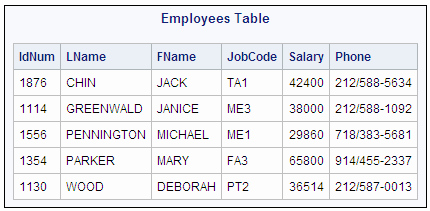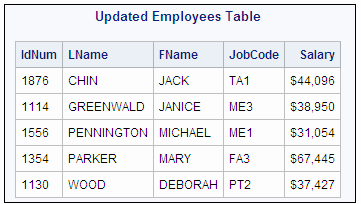SQL Procedure
- Syntax
 Procedure SyntaxPROC SQL StatementALTER TABLE StatementCONNECT StatementCREATE INDEX StatementCREATE TABLE StatementCREATE VIEW StatementDELETE StatementDESCRIBE StatementDISCONNECT StatementDROP StatementEXECUTE StatementINSERT StatementRESET StatementSELECT StatementUPDATE StatementVALIDATE Statement
Procedure SyntaxPROC SQL StatementALTER TABLE StatementCONNECT StatementCREATE INDEX StatementCREATE TABLE StatementCREATE VIEW StatementDELETE StatementDESCRIBE StatementDISCONNECT StatementDROP StatementEXECUTE StatementINSERT StatementRESET StatementSELECT StatementUPDATE StatementVALIDATE Statement - Overview
- Examples
 Creating a Table and Inserting Data into ItCreating a Table from a Query's ResultUpdating Data in a PROC SQL TableJoining Two TablesCombining Two TablesReporting from DICTIONARY TablesPerforming an Outer JoinCreating a View from a Query's Result Joining Three TablesQuerying an In-Line View Retrieving Values with the SOUNDS-LIKE Operator Joining Two Tables and Calculating a New ValueProducing All the Possible Combinations of the Values in a ColumnMatching Case Rows and Control RowsCounting Missing Values with a SAS Macro
Creating a Table and Inserting Data into ItCreating a Table from a Query's ResultUpdating Data in a PROC SQL TableJoining Two TablesCombining Two TablesReporting from DICTIONARY TablesPerforming an Outer JoinCreating a View from a Query's Result Joining Three TablesQuerying an In-Line View Retrieving Values with the SOUNDS-LIKE Operator Joining Two Tables and Calculating a New ValueProducing All the Possible Combinations of the Values in a ColumnMatching Case Rows and Control RowsCounting Missing Values with a SAS Macro
Example 3: Updating Data in a PROC SQL Table
| Features: |
UPDATE statement : SET clause CASE expression |
| Table name: | EMPLOYEES |
Program to Create the Employee Table
proc sql; title 'Employees Table'; select * from Employees;
Program Description
Program to Update the Employee Table
proc sql;
update employees
set salary=salary*
case when jobcode like '__1' then 1.04
else 1.025
end;
alter table employees
modify salary num format=dollar8.
drop phone;
title 'Updated Employees Table';
select * from employees;
Program Description
Update the values in the
Salary column. The UPDATE statement updates the values in EMPLOYEES.
The SET clause specifies that the data in the Salary column be multiplied
by 1.04 when the job code ends with a 1 and 1.025 for all other job
codes. (The two underscores represent any character.) The CASE expression
returns a value for each row that completes the SET clause.
proc sql;
update employees
set salary=salary*
case when jobcode like '__1' then 1.04
else 1.025
end;Modify the format of the
Salary column and delete the Phone column. The ALTER TABLE statement
specifies EMPLOYEES as the table to alter. The MODIFY clause permanently
modifies the format of the Salary column. The DROP clause permanently
drops the Phone column.
Copyright © SAS Institute Inc. All rights reserved.

